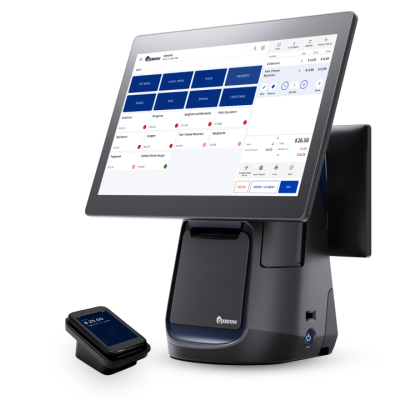How to Analyse Your POS Data
We live in an age of information. Commerce has become so competitive that every decision a business makes can give or take an edge that proves the difference between success and failure.
In such a high-pressure environment, managers need to collect as much information as possible to know they are making the right decisions at the right moment. No device in your business is better placed for data collection than your POS. So what information does your POS gather? How and when should you conduct your POS data analysis?
What is POS data: a POS data definition
One new to POS might wonder just how much information could be gathered by a device to process transactions. In recent years, the capabilities of technology have expanded greatly, so depending on your provider, the answer may vary greatly. But any definition of point of sale data needs to be broad.
Epos Now tills have reports broken down into well over fifty different pages disaggregated into categories for transaction data, sales reports, customers, stock, banking, accounting, and auditing. Some reports will necessarily be used more than others, however, all have great value to businesses when used appropriately.
The system documents every transaction a business makes, which is extremely useful in refund and complaint situations. Transaction data includes method and amount paid, items sold, are located to specific tills and staff members; they are also dated and timed. This means any dispute about any of this can be quickly resolved and businesses can take appropriate action.
Product reports
If a business is to fully benefit from POS reporting, some of the report pages that will be used the most will be based around products. These reports can tell managers when, where, how, and even why products are or are not selling well.
 For instance, a product that is underperforming can be moved and the sales trends compared. Alternatively, sales figures can be compared over long periods of time and one might discover that some products only sell well in certain times of the year. That product ought to be seasonal and can be archived by your POS and brought back when it sells well. Product placement ideas can be reinforced by the hard data of these reports.
For instance, a product that is underperforming can be moved and the sales trends compared. Alternatively, sales figures can be compared over long periods of time and one might discover that some products only sell well in certain times of the year. That product ought to be seasonal and can be archived by your POS and brought back when it sells well. Product placement ideas can be reinforced by the hard data of these reports.
POS sales data is invaluable for its ability to retain and manipulate figures until a reason for good and bad sales becomes apparent. These systems can do so over the entirety of a product’s life and can help with menu or product rotation by providing concrete data on product performance with the efficiency even the most pedantic of managers cannot match.
While this is essential for ensuring every product is selling, POS data can also recognize which products are driving profit by comparing the number of sales with the markup. If cost prices are inputted for each product, managers can look not only at the number being sold but the more important figure of how much profit is being made.
Of course, products that sell high do not need to sell as many times over to make good money. Still, it can be easy to forget that when watching dozens of the same sales being made each day on a low-profit bestseller. POS data analysis is an excellent way of removing attachment to ideas and products from the equation.
Profit figures also account for diminishing returns due to promotions and can tell businesses whether the sales boost from a promo has increased profit, or merely increased the number of sales made at the expense of profit.
Gain all the advantages of a POS with detailed, flexible, downloadable reports, and so much more:
- Manage and update products quickly with easy to use software
- Expand your business into multiple channels and integrate with a variety of online platforms
- Manage multiple locations and salespoints with multi-site management
- Keep queues short with streamlined, modifiable sales processes
- Choose a setup that suits you with software and hardware options

Stock made simpler
Keeping track of stock levels is one of the most basic but important tasks any business can do. In retail or in hospitality, being unable to sell a product due to running out or because of passing use by dates can be a huge frustration. POS data can keep this to a minimum by informing managers about non-selling stock and low stock levels.
Epos Now systems can do this by sending daily emails when products hit a minimum threshold, telling managers to stock up. This even saves the labour of checking the report, as the process is automated.
Another useful detail POS reports show is patterns in stock discrepancies. While Epos Now’s staff management allows businesses to determine who can and cannot perform stock control, when stock checks are done, there will often be differences between the systems figure, and the number of items left of a product. There are many natural reasons this may happen: wastage, stock movements, a missing box. However, POS systems record these changes when they are updated and will show patterns.
The obvious benefit to this is if a single product has a large number of discrepancies, stock theft is a possible reason, and this can help with spotting that happening. Noting when and where this happens can help managers understand why stock is being lost, which can be invaluable to businesses.
Money matters don’t have to take months
 Retail POS data can boost profits and save enormous amounts of time poring over receipts and EOD reports. Accounting without POS can mean a lot of tedious maths to gather quarterly figures and to complete tax processes. Both hospitality and retail benefit a great deal from the preset accounting reports retail point of sale systems generate.
Retail POS data can boost profits and save enormous amounts of time poring over receipts and EOD reports. Accounting without POS can mean a lot of tedious maths to gather quarterly figures and to complete tax processes. Both hospitality and retail benefit a great deal from the preset accounting reports retail point of sale systems generate.
Epos Now can also integrate with existing accounting platforms like Sage, and so POS data can be automatically sent over to those programs and manipulated in the necessary ways.
With transaction and banking data in electronic form, on cloud-based software, and downloadable in multiple formats, accessing the key figures for tax and banking purposes is very simple and much quicker.
Staff, customers, and more
The extent of POS data collection is significant, and to different businesses, some reports are given more attention. Customer insights on spending habits and credit information can be useful for marketing and CRM purposes.
Staff data can help inform man-management and can show which staff members are better at selling which products, informing businesses how their team can help each other improve performance, and showing who needs a little bit more guidance.
Most businesses will find there are reports needed on a daily basis, others come up every few weeks, and some only on occasion.
Learn more about your business with Epos Now
Epos Now has spent over a decade providing point of sale systems with detailed reporting tailored to business needs. With POS software and POS hardware available for every industry whether in retail or hospitality industry taking advantage of technology has never been easier. Epos Now customers can:
- Download and upload data and product adjustments to complete managerial tasks in next to no time
- See their favourite reports before anything else on a dashboard homepage like no other
- Integrate their POS with some of the best business software around
- Receive the best advice and support 24/7 from an expert POS service team
To find out more, contact our team or submit your information below and be given further data or a data collecting POS trusted by over 40,000 businesses.
Speak with one of our experts and learn more about Epos Now's top-selling technology




